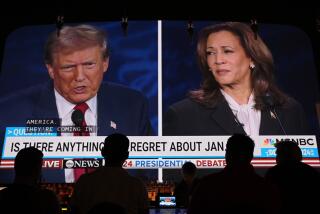Don’t bet the House
- Share via
THE HOUSE OF REPRESENTATIVES is due to vote soon on proposals to ban online gambling, and the deck seems stacked in favor of sound bites over sound policy. Federal law already outlaws businesses from using phone lines to place or receive bets across state lines, particularly when the bets are on sporting events. That restriction, although it’s not a clear ban on Internet gambling, has stopped the country’s major casinos from taking bets online. What it hasn’t done is stop Web users from gambling around the clock at offshore sites, often based in Central America and the Caribbean. According to one estimate, offshore sites offering poker games, sports betting and casino-style gambling collect $12 billion a year, about half of it coming from American wallets.
In response, the House Judiciary Committee approved a bill last month that would explicitly ban online gambling businesses of all kinds. Even worse, to cut off the money supply for virtual gaming, the committee also backed a bill that would impose significant new regulatory burdens on financial companies, which would be barred from supporting electronic wagers or payouts. The bills are expected to be consolidated and debated on the House floor this month.
All of which raises the question: Doesn’t the federal government have better things to do than try to block people from going online to make a wager on the Super Bowl or the Final Four?
Supporters of the measures insist they are trying to curb the spread of gambling addiction, protect minors and crack down on unscrupulous offshore operators. They may be right about online gambling’s link to self-destructive spending, given its isolating, rat-at-the-pellet-bar quality. But the fact that the House bills wouldn’t outlaw online betting on horse racing, which Congress allowed states to authorize in 2000, seems to belie the sincerity of the effort. And isn’t it a hallmark of a free society that we don’t outlaw otherwise inoffensive vices simply because some people harm themselves?
Congress should be clarifying the law in the opposite direction. Legalizing online gambling and regulating the industry -- as Britain has done -- is the best way to toughen protections against gambling by minors, identify problem gamblers and ensure that online sites are more scrupulous than the back-alley bookie. Wouldn’t it be preferable to have bettors deal with the sports book at Caesars Palace or the MGM Grand -- heavily regulated Las Vegas casinos that are part of publicly traded companies -- rather than with some fly-by-night offshore player?
Legalization also would allow the government to tax the industry and mitigate its hypocrisy in sanctioning some forms of gambling, such as state lotteries, but not others. Moralistic members of Congress should not be allowed to thwart online freedoms. It’s unlikely they will succeed anyway. The issue is whether Washington is to have any leverage over the burgeoning online gambling world, or whether that world will remain beyond the reach of U.S. law.
More to Read
Sign up for Essential California
The most important California stories and recommendations in your inbox every morning.
You may occasionally receive promotional content from the Los Angeles Times.










